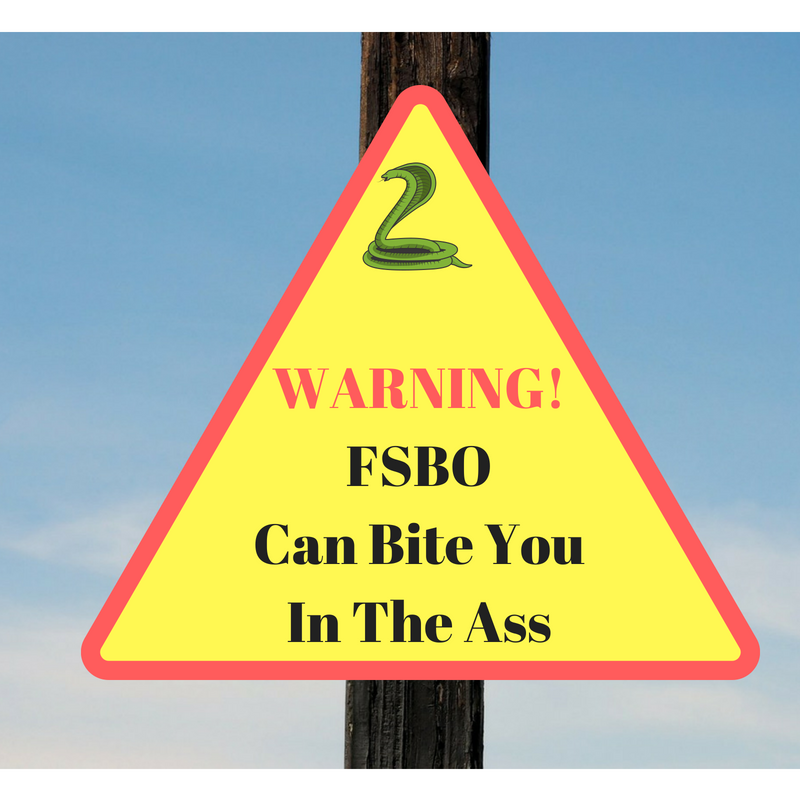Dangers of Selling Without An Agent

Selling your own home can sound enticing, very enticing if all you are thinking about is not paying an agent's fee. Did you know handling your home's sale (FSBO) can lead to disastrous results? Here are a some dangers.
8 reasons to sell your home with an agent
The “For sale by owner” (FSBO) method seems a great way to save thousands of dollars when you sell your home.
After all, the standard real-estate agent's commission is 6% – that's $15,000 on a $250,000 home. Given the size of this fee, you may think that acting as your own seller's agent will surely be worth the savings. Here are eight reasons you should think again.
1. Buyers' agents may not want to show your property to their clients.
In a for-sale-by-owner deal, the buyer’s agent knows there won't be a professional colleague on the other end of the transaction. Even if a client insists on seeing your home, the agent might discourage making an offer, citing the hassles and risks of trying to close the deal without a professional representing the seller – and without a guaranteed commission.
“There are only two reasons why I show an FSBO: There is no other inventory available or the price is ridiculously low,” says Bruce Ailion, a realtor with RE/MAX Greater Atlanta. Every experienced broker has been burned by an FSBO transaction where the seller did not pay the full agreed ommission, or any commission at all, to the agent who brought the buyer, Ailion says.
“FSBO sellers are viewed as unrealistic, unreasonable and difficult sellers whom professional realtors have rejected,” says Ailion.
But there are buyers' agents who will show your property under the right conditions. Philadelphia realtor Denise Baron of Berkshire Hathaway HomeServices Fox & Roach says that as long as she has a signed buyer’s agreement stating that when she shows a FSBO home that her agency gets paid, she is confident.
“I also have an agreement signed beforehand by the owner who is selling their own property or home,” Baron says. The agreement states what percentage fee the seller will pay the agent. (The agent may specify a 6% commission, trying to nab both the buyer’s and seller’s side. Instead, negotiate the total commission to a more reasonable 2% to 3%.) The agreement also clarifies that the agent is only working on behalf of the buyer, and that as a buyer’s agent, she has a duty to disclose to her client all information the seller provides to her, such as the need to sell by a certain date.
2. It's harder to keep your emotions out of the sale.
Selling your home is typically an emotional process. Having an agent keeps you one step removed and makes you less likely to make stupid mistakes such as overpricing your home, refusing to counter a low offer because you're offended or giving in too easily when you have a deadline for selling. (See also: "Selling Your House? Avoid These Mistakes.")
“A realtor can follow up without communicating a sense of eagerness or desperation; following up is their job,” Ailion says. "When a seller repeatedly checks, it signals rightly or wrongly the willingness to accept a lower price.”
If you forgo an agent, you'll also have to deal directly with rejection every time a buyer's agent tells you her clients aren't interested. “As the homeowner, it can be quite upsetting hearing some of the comments that are made by buyers and oftentimes their agents,” says David Kean, a realtor with Teles Properties in Beverly Hills, Calif.
An agent can take the sting out of the rejection and put a positive spin on any negative feedback. “It is more difficult for them to keep their emotions out of the sale because there's no third party to bounce anything off of,” says real estate broker Jesse Gonzalez, owner of Archer Realty in Santa Rosa, Calif. “For instance, if the property sits on the market, the homeowner doesn't know the reason the home is not selling."
"The emotions will always be there for the seller," Gonzalez adds. "But constructive criticism can become easier to digest for the seller when it comes from a broker who is on their side, trying to get the best for them.”
3. It's not your full-time job.
Can you rush home from work every time someone wants to see your home? Can you excuse yourself from a meeting every time your phone rings with a potential buyer? At the end of a long work day, do you have the energy to take advantage of every possible opportunity to market your home? Are you an expert in marketing homes?
Do you have any experience doing so? Your answer to all of these questions is probably "no." An agent's answer to all of these questions is "yes." In addition, by going through an agent, you’ll get a lockbox for your front door that allows agents to show your home even when you aren’t available.
4. Agents have a larger network than you do.
Yes, you can list your home yourself on Zillow, Redfin, Craigslist and even the Multiple Listing Service (MLS) that agents use. But will that be enough? Even if you have a large personal or professional network, those people will likely have little interest in spreading the word that your house is for sale. You don't have relationships with clients, other agents or a real-estate agency to bring the largest pool of potential buyers to your home. A smaller pool of potential buyers means less demand for your property, which can translate to waiting longer to sell your home and possibly not getting as much money as your house is worth.
Read more at: https://www.investopedia.com/articles/personal-finance/071514/8-reasons-not-sell-your-home-without-agent.asp
Looking to buy or sell a home? Give us a call or check out our properties!




